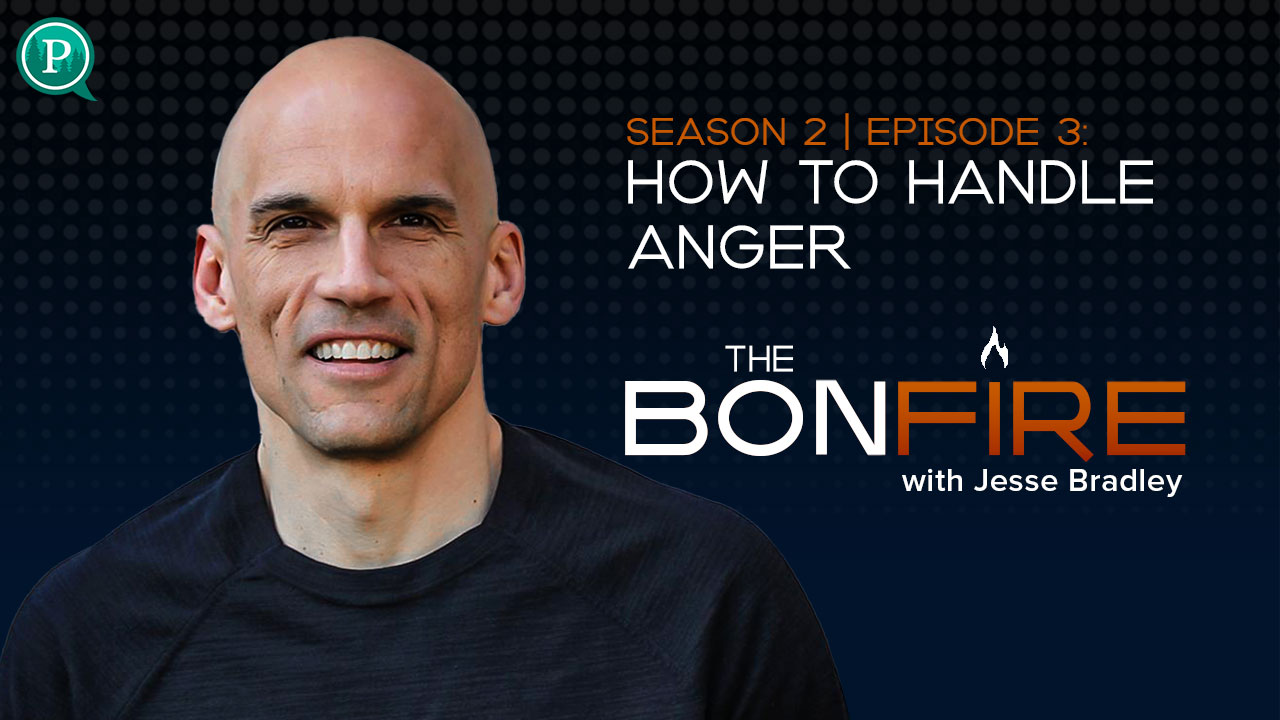The Bible tells us to be slow to become angry. Anger by itself is not sin. But God tells us to have a long fuse. How can we do that? Let’s walk through some verses today as we see how Jesus deals with his own anger and how we can take practical steps with the help of the Holy Spirit in our own lives!
If this resonates with you, please rate, review, and subscribe where you listen to podcasts. For updates follow me @jessejbradley on all socials and for the latest videos check out my YouTube channel Jesse Bradley. The best is yet to come!
Show Notes:
Anger is not a sin. Jesus was angry. We all feel anger. How do you respond? The Bible says to be slow to become angry. A long fuse. In your anger do not send. Ephesians chapter 4 verse 26. James chapter 1 verse 19.
Jesus was angry when they tried to hinder kids from coming to him. When they told him not to heal on the Sabbath. When they were greedy, people, taking advantage of other people in the temple and blocking people from seeking God. When the religious leaders were hypocritical. Anger can move us forward. Frustration in pain can fuel purpose and passion. Matthew chapter 23. Mark chapter 3, verses, four and five. John chapter 11, verse 33. Jesus was angry about the sickness and death.
Conflict resolution is a challenge. Driving or sports our contacts where people lose their cool. Marriage, friendships, and the work environment include how to handle conflict well. Forgiveness. De-escalation. Resolving things today and avoiding lingering resentment, and bitterness. No put downs or anything abusive. Listening well. Trying to understand the other person. Lots of practical steps.
We need the Holy Spirit help. Self-control is a fruit of the spirit. Galatians 522. Have courageous conversations. Be humble and honest. Conflict can awaken us and stir us to make a difference in this world. When you see things that are wrong tackle injustice. Anger can be the first step towards becoming part of the solution.
Special thanks to World Concern for sponsoring The Bonfire Podcast.
Transcription:
Pastor Jesse Bradley:
There’s a habit that you can cultivate that’ll renew your mind and transform your life, and that’s the reason I wrote the Power of the Second Thought. My professional soccer career ended with a tragic illness in Africa. I was fighting for my life for one year and it took 10 years to fully recover. I just didn’t have a roadmap. I didn’t have the tools. I didn’t know how to take the next step forward. I didn’t find hope until I lost it, and I discovered that hope is available to everyone. That hope and abundance is relational. It’s also habitual, and there’s an indestructible hope that’s greater than the challenges that we face. Maybe you’re navigating some detours and difficulties right now and you need some direction. Check out the book, look at the information below.
Welcome to the Bonfire. Thanks so much for joining us again. We’re in season two, episode three, and we’re going through specific situations. And remember, this podcast is all about God’s presence. God is love. God is light. God is a consuming fire and there’s no greater joy than being near to God. This is the living God, not dead religion. We’re not going through the motions, but this is everyday life 24/7 in this relationship where we live, work, learn, and play, and we want to go deeper with God around the bonfire. There’s stories we love to share and dive into the stories of the Bible. And my prayer is that you’re really growing. This is transformative. Today we’re going to look at temper, anger. How do you handle it when you have those feelings? We all have them and a lot of us can go sideways. It’s easy to go the wrong direction when you have those big feelings and how do you respond to those moments where you’re really ticked?
And as we dive into this topic, we’re going to look at Jesus, especially focus on him today and then give you some options, some practical stuff so that when we finish today, you feel like you’ve got access to what God wants to do in this part of your life and then you’ve got a plan. And as we do that, I think we’re going to respond differently to situations because of our time together today and what God’s doing. As we begin with anger, think about the situations that make you angry. When are you frequently angry? For some people it’s driving. They say that our right foot is the last part, when we follow God, that’s the last part to say yes because we want to drive in such a way that well, sometimes we get angry at the other people because they cut us off or we get frustrated or we’re breaking some laws.
But driving is one spot where it’s hard to stay calm. Sports is another one, and when you’re playing a game, it’s competitive. You’re in it to win it. You’re playing hard. The ref makes a bad call. Just think of all the referees across America and what they deal with every week. I’m talking youth sports, like five-year-olds are out there having fun running around and the parents are screaming at the ref. Can you imagine if there was a ref cam and we caught all the comments, reactions, posted that live online, social media, it’d be embarrassing for a lot of people because when it comes to sports, a lot of us see that as, Well, that’s a different arena. It’s okay to be blowing my top or have a short fuse in that space. For some people it’s business and when they go to work, they’re just different and they go into a mode that’s not great and they talk down to people and they say words that they’re going to later regret because they’re angry.
So there’s a lot of different spaces and places during the week that if we don’t have self-control, we are going to repeat the same patterns. For some people, it’s actually with the people you love the most. It’s with family, friends, dating, relationship, marriage. How do you handle conflict and what do you do when you get angry? Here’s what the Bible says. And first of all, be slow to anger, slow to speak, slow to become angry and quick to listen. That’s one quick thing, two slow things. Don’t we often reverse it? We’re often slow to listen, quick to speak quick to become angry. It’s exact opposite of what God says. Having a longer fuse, how long is your fuse? How long does it take before you start to lose your cool? And slow to become angry, we’re going to need God’s help with this one. This is a topic where we go to the Lord.
It’s a good place to be relying on the Lord. And also the Bible says, and this is so interesting in Ephesians four, In your anger, don’t sin. It’s a given. We’re going to be angry, but don’t sin. Here’s why that’s important. Anger is not necessarily sin. You can feel angry and not sin. Anger is a normal emotion. It’s what you do when you’re angry and we know anger is not a sin because Jesus himself was angry and Jesus never sinned. There were situations where Jesus was indignant and I want to share a couple of those with you, and this is to encourage you because there are situations that you should feel some anger and it should lead to becoming part of the solution or speaking truth or loving people differently. And Jesus, one situation is that little kids were coming to him and the disciples were saying, no, no, no.
Keep some distance from Jesus. And Jesus was furious. He was upset. He said, don’t do anything to hinder these little ones coming to me, for the kingdom belongs to such as these. Now, that’s a word right there. I mean for every parent, for every church, for anyone who’s working with kids, never stop kids from coming to Jesus. Every child’s a gift. Every child has a soul. Every child’s made in the image of God. Give your child every opportunity, set them up for success so they can walk with God, know God’s love, be secure in God and in that relationship and enjoy God. That’s what Jesus was really prioritizing, he was serious about that. And when people tried to keep the kids away, he was indignant. That’s one situation. Here’s another situation. It was Sabbath and the Pharisees are legalists. Jesus hates legalism. He hates dead religion.
And they said, no, you can’t heal on a Sabbath. A man had a hand that needed to be healed. And Jesus, even while they’re watching makes it very clear, he wants everyone to see this, heals the hand heals on the Sabbath and then says the Sabbath is made for us. We are not made for the Sabbath. In other words, the religious leaders were completely missing the purpose of the Sabbath. It’s for restoration, it’s for healing. And Jesus healed on the Sabbath and what he was doing is opposing some of that tradition, some of those human rules. You got to be so careful with the religion. There’s extra human rules and legalism. Jesus went face to face with that and says, I’m not having that. In essence, that’s what he did when he healed the hand, Jesus made it very clear the purpose of the Sabbath.
That’s another example. Jesus also was indignant around the phonies. These same religious leaders in Matthew chapter 23, he doesn’t mince words, you hypocrites, and he calls them out again and again. He says, yeah, you’ve got the outside so cleaned up, but in the inside it’s dead man’s bones. You love to appear so spiritual, but on the inside you’ve got hypocrisy and you just burden people and you just hand out guilt and shame and you put this on people’s shoulders. He called them out for everything. And one reason I like to share this passage about being angry is because there’s a lot of people who have had negative experiences and this passage reminds us that when they see religious hypocrisy, Jesus agrees with them, it’s wrong, it’s not good. And when people have scars because they’ve been on the victim side of some of the religious hypocrisy and mean behavior and judgmentalism, when they’ve been on the receiving side of that, they’re hurting and they’re thinking God is with those religious leaders who are doing it, but the truth is God is not with them.
God is with the victim. And in that situation, every time the religious leaders tear someone down and think they’re better than someone else, Jesus is with the one who’s hurting. I share that because if you’ve had negative experience at a church and you need to separate what those people have done to you and who Jesus is and there’s healing there, that’s another insight into the anger that Jesus had. Now, there’s a lot of instances. One other example I’m going to share is he flipped the tables. Say, why was he flipping tables? Because it was in the synagogue in the temple, and not only were there people who were greedy and they were ripping people off and taking their money, but also they were blocking in that space. It was supposed to be a house of prayer for all nations in the court of the Gentiles, they were blocking people and their access to God.
When Jesus sees corruption in the church, when he sees people not having access to pray, to seek God, when he sees that God’s glory is being diminished and is being tainted through what’s going on, and as people are getting ripped off, Jesus flips the temples and enough is enough. Jesus has a holy righteousness and he has a holy anger and there is space for that in your life. There are things that should make you angry. When you see that there’s human trafficking that should wake you up and stir you up. When you see that there’s kids without water and food, that should get your attention, you should feel some anger that they don’t have what they need. Notice that when Jesus gets angry, it’s often to protect or provide for people. It’s for the father’s glory. And why do we get angry when we get angry, so often it’s personally, someone has done something to me.
Well Jesus, in those situations, it’s rarely that. Listen, when someone’s attacking him, what does he pray on the cross? Father, forgive them for they know not what they’re doing. And so when you’re angry, check and make sure it’s not selfishness, pride, stop and think, why am I getting angry? What is this all about? Make sure you’re not getting angry about the wrong stuff. Make sure you’re not blowing something out of proportion. Make sure you’re not turning small things into big things. Make sure it’s not just all about your little pet peeve, right? Jesus isn’t flipping tables because he has a small pet peeve. He’s not flipping tables because his team loses. He’s not flipping tables over little things. He’s focused on God. He’s focused on people and he’s focused on souls. And as you see injustice, yes, you want to tackle injustice. Anger might be that catalytic piece to tackle injustice.
That’s one aspect of anger that’s often overlooked and that’s where I wanted to start today is that anger is not a sin and Jesus got angry. Study why he was angry. And then in the same way, you should have a holy, righteous anger and stirring because that’s going to be oftentimes a starting point to the solution. You’ll get angry before you take action. You’ll feel some anger before you make a difference. You’ll feel some anger before you help people and provide for people and make things right. That initial anger can be used in a very good way. That’s what happened with Jesus.
For generations, children and families in the poorest places in the world have struggled to find clean water, food and a chance for a brighter future. But all that can change in this generation. You can be part of the solution. Go to worldconcern.org. As you participate, this is what will happen. Villages will be transformed far beyond where the road ends and children and families will receive the love of Christ. You can make a difference. Go to worldconcern.org. Let’s be part of the solution together.
Now, what about the anger that is not so beneficial or at least doesn’t always go the right direction? Let’s talk today about conflict resolution and God wants to guide us in this. The way you resolve conflict and all of us have conflict. You have it at work, you have it with friends, you have it with a roommate, your spouse, extended family, the in-laws, people in your community.
People are different than you sometimes and you don’t understand their vantage point. There’s a lot of ways that conflict plays out. You’re going to be in conflict and how are you going to deal with it? You know the two extremes. You don’t want to be in denial and say, oh, there’s no conflict. Have fake relationships, shallow relationships, be super passive, operate in fear, and then never have those courageous conversations. If you do that, it’s going to feel initially like, oh, you just always live in peace. But the truth is, you’re probably not growing. You’re probably not trying to understand the other person. You’re probably not helping them grow. You’re probably not going as deep as you could in relationships. So the safe way is to be in denial and just act like nothing’s wrong and then be fearful of everybody and there’s not much growth. The other extreme is you lose your temper.
You say things you later regret, you hurt people, you act out of control. You’ve got rage, you’ve got a temper. People are fearful of you. That’s the other extreme. And avoiding those, how do we handle conflict? I remember Tommy Nelson, he’s a pastor in Texas and incredible teacher of God’s word, very practical. He has a lot of series on marriage, and I remember when he said fight fair. Conflict, or you could call it intense fellowship, whatever your favorite phrase is, how do you fight fair? And I remember for Lori and I going through premarital counseling, we decided before the marriage we were going to agree on conflict resolution. Now, when I meet with couples, premarital counseling, almost all of them say conflict. We’re really good at that. We handle it really well. Well, there’s a difference when you’re dating, issues are kind of here, when you get married, they’re right here and you can’t fake anything in marriage.
You really know the other person. They know you and you’re just different. There’s going to be some conflict. Lori and I are exact opposite on personality scales. Whenever we take those tests, that’s a really good thing because we compliment each other and there’s a partnership and we love each other. We work well together and we need each other. On the flip side because we’re so different, even folding clothes, we do that so different, and that sounds so dumb in one sense, how could you have conflict over folding clothes? But one person does it this way, one person does it that way. There’s a system and simple things like that, conflict can come and how do you handle it? So when Lori and I were going through premarital counseling, here’s a few things that we recognize we’re not going to do. We’re not going to yell at each other and we’re not going to swear.
We’re not going to go into put down modes. We’re not going to be abusive. We’re not going to get physical or violent. We’re not going to break anything. We’re not going to let the conflict go during the day that we’re not going to ignore it and we’re not going to go to bed any night when there’s unresolved conflict. Now that doesn’t mean everything’s perfect and settled, but we’re going to talk through it as much as we possibly can that day. We’re not going to carry resentment and bitterness. We’re going to forgive each other. Those are some examples of things we agreed upon before the marriage started and that’s what we’ve been committed to. And why is that important? That commitment’s important because once conflict comes, it’s so easy to just say and do whatever you want to say and do and to do things that are foolish.
Proverbs chapter 15, one, A gentle answer turns away wrath. You can either escalate or you deescalate, and when you escalate, that’s going to be through your reactions, your comments. You roll your eyes, you slam a door, you say something mean. All those things escalate conflict, or you deescalate the conflict. And a gentle answer if you’re a good listener, that deescalates, if you ask questions, if your goal is understanding, that deescalates, one of the fruits of the spirit is self-control and the Holy Spirit, once you put your trust in Jesus dwells inside of you. You are not God, but God dwells in you. God knows we need help every day. God knows that we need the help of the Holy Spirit. The Holy Spirit convicts you of sin. So when you’re starting to go the wrong direction, say the wrong thing, the Holy Spirit kind of like that, still small voice.
You know it in your heart and in your mind. What you’re doing isn’t right. This isn’t good. This isn’t from me. And the Holy Spirit communicates. The Holy Spirit redirects us and also not only rebukes us, but then trains us, guides us, empowers us, gives us wisdom, guides the words we say, takes over in conflict and brings self-control. If you don’t have self-control, you’re going to go from green to yellow to red, and then you’re going to operate in the red. You think of that simple stoplight, and as parents, we’ve shared this with our kids. There’s green, there’s yellow, and there’s red. Once you’re in red, don’t keep talking. That’s when you got to step back. You say, you know what? I need a pause. I need a break here and my anger is getting the best of me. Let’s talk in a few minutes and you come back to yellow, get back down to green, and then continue the conversation.
So then if you break one of these guidelines, it’s really important you apologize and that apology is, I’m sorry, I was rude, I was short. I’m sorry I interrupted you. I’m sorry I… Fill in the blank. Own your stuff and apologize. And when you apologize, don’t say, I’m sorry, but you said this, this and this. That’s not an apology. That’s not going anywhere. So instead of that, own your stuff, apologize. Be the first to apologize. That’s a challenge. Your pride will hate that. When I’m in a conflict, you know what my pride wants to do? Kick in and say, win it. You’re right. Prove it. She’s wrong. The only win is the harmony that you experience, the restoration you experience. And the Bible says, Do everything you can as far as it depends on you to live in peace and harmony with one another. You can’t completely control the other person’s reaction, but you can control, with the Holy Spirit’s help, how you respond in that anger.
Proverbs, as you read through that book in the Bible, a lot of practical wisdom, short statements, very profound, very deep, talks about a hot-tempered man, talks about a hot-tempered woman. And when you think about a fuse, you either have a long fuse or a short fuse. A hot-tempered person has a very short fuse. Love is not easily angered. The Bible says, that’s one Corinthians 13, love is not easily angered. Love keeps no record of wrongs. If you’re around someone who always keeps a record and then short fuse, the Bible says you need some space from that person, it’s not wise, because you’re going to get hurt. They’re going to take you down. You also might start doing what they’re doing. If you hang out with someone who’s hot-tempered, you’re going to be more likely to start acting and responding the way they are.
And if you build those friendships with hot-tempered people, they’re going to cause problems. They’re going to cause conflict. And now you’re going to be in the middle of a hot mess. Be wise about your friendships and notice when someone has a temper, sometimes we like to give a free pass and say, oh, that’s just Jane, or that’s just James. That’s just who they are. There’s no free passes with the temper and sadly there’s brutal stuff that happens. There’s a lot of abuse. When people get angry, there’s verbal abuse, there’s physical abuse and there’s restoration that’s needed. The irony is, the people we love the most and spend the most time with can hurt us the deepest. Conflict in the home, if it starts to get out of control, a house divided will not stand. There’s a reason in America why 50% of the marriages end up in divorce right now, and that’s tied to anger, is tied to conflict resolution, and it’s tied to commitment. As you are going to be in conflict because two people with two wills and two personalities and two preferences, there’s going to be conflict.
The Bible says submit to one another. Well, what does that mean? It could be something small like in a marriage and you’re choosing where you’re going on vacation or it could be with a friend and who’s going to, and you fill in the blank. What’s your common situation when there’s conflict? This is what I’m trying to walk through in a practical way today. Identify a couple things, and that’s why you got to go deeper. There’s no healing until the revealing so often in life. And if you don’t get honest about your conflict resolution and your anger and your tendencies, then there’s not going to be a transformation. And you’ve inherited a couple things. Your parents have modeled something for you and that’s what you’ve seen. You’ve also picked it up from friends and how they handle it. And then you’ve got your own personal wiring and how you tend to handle things.
And this is what you’ve got to recognize. If we’re going to move forward, we’re going to change because we want to be different. We want to handle things differently. If that’s the case that you have that desire to grow, then first recognize what are the situations that you most likely during the week, you’re going to get angry. Have you recognized those? What are those in your life right now? And then how do you usually respond? What’s typical for you? What do you do with your anger? And I was someone who just stuffed it and I don’t know where that all came from. Maybe because I grew up in a home where my parents had a lot of conflict and they were divorced. Maybe I saw that and thought, I just don’t want anything to do with conflict. Maybe I was scared, confrontation, courageous conversations. But I was someone that my first approach to this in life I would say would be to avoid conflict at all costs and have no conflict whatsoever.
The upside again is that there weren’t a lot of arguments. There wasn’t a lot of conflict in my life, but the downside, I didn’t really share what I really saw, what I thought. I didn’t become part of the solution. The relationships weren’t deep. I didn’t learn how to work through things. I didn’t learn how to express myself. I didn’t learn how to stay close to another person when they’re feeling frustrated. I just didn’t learn any of that, which is vital in relationships. And it took me a long time. Jesus coming into my life was a game changer. That’s the biggest difference because with Jesus, there’s a couple of things that happened. Jesus gives you courage. Jesus gives you peace, and you end up walking through conflict in a new way. I walk through conflict now according to what the Bible says, not what I’ve seen in other people, and I make that my north star.
So in my most important relationships, I come back to what does the Bible say? Don’t let the sun go down while you’re angry. Whoa, how do I put that into practice? My wife and I aren’t going to go to bed with resentment or bitterness ever. That’s our commitment. By the grace of God, with the help of the Holy Spirit, every day we’re going to talk it through. We might agree to disagree on something, but we’re going to talk it through and love each other and go to bed in that peace and shalom, and that’s what we’re committed to. So one Bible verse can totally change the way that you do marriage. Also praying. When you pray, you come back into your right mind, right perspective. You get God’s perspective, God’s peace. And that was something I never grew up with because I didn’t come to know Jesus later.
That’s an incredible tool when you feel angry. And then the anger that I would feel in there that was connected to some things that I needed to do. I can’t stuff that anger. And so now I’m very proactive around some stuff and it might start with a feeling of anger, like I’m angry how these people are treated or neglected or I’m angry, sometimes in the spiritual realm, the devil comes to steal, kill and destroy. The devil comes to blind eyes. The devil comes to take people down, and I want to build people up, encourage and empower people. So when I see what’s going on in the world and I see the evil, I see the darkness. That awakens me. That stirs me to say, no, we’re going to do something twice as big or strong. Go in the right direction and God can bring good out of a terrible situation.
Those kinds of situations and that kind of anger can fuel you in a good way. I found in sports that I often played the best when I was angry. I mean, there was a quarterback, Andrew Luck, and he would say, he doesn’t start playing well until he gets hit really hard one time in a game. When there’s something that happens in a game and now of a sudden I feel some anger around that, maybe it was a bad call. Maybe a guy kicked me. It was a cheap shot. It’s like when I feel that anger, now I’m locked in. Now I’m focused. Now it’s game on. And when you see things that are wrong in this culture, it should be game on. Let’s go. Let’s make a difference. Let’s make this better, and that anger can be a fuel.
I want to wrap this up today, thinking about anger from a few different angles. And I don’t know what your definition and kind of perspective of anger has been in the past, but it’s not always a bad thing. Jesus was angry. In your anger, don’t sin. Study Jesus, and when he became angry and how he responded and how he made a difference. And then there’s also anger that leads to the wrong stuff and it’s escalation, it’s pain in relationships, and there’s a temper. There’s words, there’s abuse. There’s unnecessary hardship because someone doesn’t have self-control with their anger. And you see it in sports. You see it in work, you see it in driving and listen, there’s a different way. The help of God, the help of the Holy Spirit. God wants to help us. The bonfire is all about God’s presence. In some situations, you might not have friends that talk to you about your anger.
That’s a deep personal thing. I mean, when’s the last time someone said, Hey, let’s talk about how you handle anger. That’s what we want to do at the bonfire. Not only talk about this, but then really think through and invite God to come into this part of our life so that we have courage, we don’t live in denial and fear. We have courage to talk, courageous conversations, and then we walk through it in a way that’s humble, that’s honest. Honesty and humility bears the most fruit. If you’re in denial, you’re not being honest. You’re not going deep, and the humility that’s needed when you have conflict with another person. No one was more humble than Jesus. Jesus had conflict constantly, constantly. Read through the gospels, Matthew, Mark, Luke, and John. Notice how much conflict he had and then see how he responds. He’s honest and he’s humble, and he’s always going to be with self-control, not sin, and think of treating others how you want to be treated.
Get out of yourself sometimes and think about the other person. How would they want to be treated? That’s helpful to think through. And Jesus brings glory to God. He redeems situations and he also recognizes Peter strikes off Mel’s ear. He heals the ear. He says, Peter, we’re not doing that. Moses got in trouble with his anger because he said he struck the rock instead of speaking to the rock. I could give so many examples of the Bible struggling with anger is common, but you don’t have to stay where you are. God wants to help. The Holy Spirit’s going to help. The fruit of the Spirit is self-control. God wants to give you self-control. I want to pray for you right now. Father God, I thank you for my brothers and sisters who are watching and listening, God, that we join together and get honest. We invite you into this part of our lives, God, where we feel frustration, anger, and how we respond.
I pray God that you’d transform us, that we would be humble and we would be honest. We’d have courageous conversations with people we love, we’d respond differently. And God, I pray just what you’ve said in your word, how to handle conflict. We would say yes to you today and I pray there’d be a great difference in great fruit for your glory. Jesus, we pray in your name. Amen. Thanks so much for joining us today. Again, if you can share this with friends, rate and review, we’d love to hear from you. If you’ve got any comments and if there’s topics you want us to cover, let us know all this at thebonfire.org, and we’re so glad we’re doing this together. Let’s keep growing in our faith and seeking God with all of our heart.








